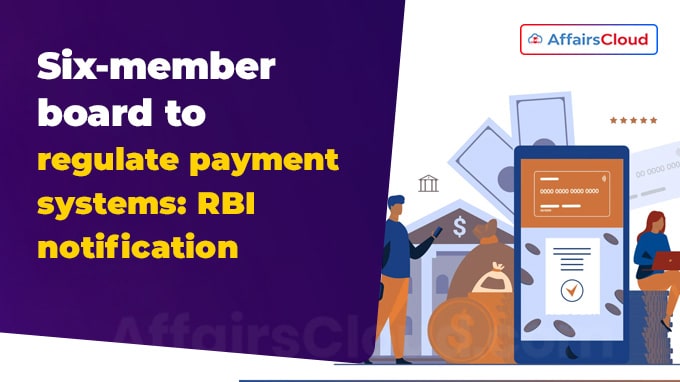 On May 21, 2025, the Reserve Bank of India (RBI) officially notified the formation of a six-member Payments Regulatory Board (PRB) under the Payments Regulatory Board Regulations, 2025 to regulate and supervise payment systems in India.
On May 21, 2025, the Reserve Bank of India (RBI) officially notified the formation of a six-member Payments Regulatory Board (PRB) under the Payments Regulatory Board Regulations, 2025 to regulate and supervise payment systems in India.
- This new board replaces the existing Board for Regulation and Supervision of Payment and Settlement Systems (BPSS).
Composition of PRB:
i.Chairperson: RBI Governor (Currently Sanjay Malhotra)
ii.Members:
- Deputy Governor (in charge of Payment and Settlement Systems), (Currently T. Rabi Sankar)
- RBI-nominated officer (from Central Board).
- Three central government nominees. (Introduced for the 1st time)
iii.Permanent Invitees:
- Principal Legal Adviser of RBI, (Currently Unnikrishnan A)
- Domain experts in payment systems, Information Technology (IT), or law (as needed).
iv.The Governor, Deputy Governor, and the nominated RBI official will serve as ex officio members.
v.Meetings: At least twice annually, with provisions for special sessions.
Note: The previous BPSS was a five-member board headed by the RBI Governor, comprising a Deputy Governor and three directors from the Central Board of the RBI, without any government nominees.
Voting Mechanism:
i.Each member of the PRB holds one vote.
ii.Decisions are made by a majority of votes among members present and voting.
iii.In case of a tie, the Chairperson (RBI Governor), or in their absence, the Deputy Governor who is a member of the board, has a second or casting vote to resolve the deadlock.
Background:
i.In 2018, an Inter-Ministerial Committee (IMC), led by the Economic Affairs Secretary, proposed an independent Payments Regulatory Board (PRB) outside RBI’s purview.
ii.However, RBI issued a ‘Dissent Note’, arguing that the PRB must remain under RBI with the Governor as Chair to ensure operational efficiency. It opposed government-majority nominations, citing conflicts with the Finance Bill’s announcements.
iii.After years of deliberation, the PRB Regulations, 2025 was established under RBI with balanced government representation.
RBI Imposes Penalties on UBI & Transactree Technologies for Regulatory Non-Compliance
On May 23, 2025, the Reserve Bank of India (RBI) imposed a penalty on Mumbai (Maharashtra) based Union Bank of India (UBI) and New Delhi (Delhi) based Transactree Technologies Private Limited (operating as Lendbox), a Non-Banking Financial Company (NBFC) for violations of Banking Regulation Act and NBFC-Peer to Peer (P2P) lending norms.
i.A penalty of Rs.63.6 lakh was imposed on UBI for
- Failing to transfer eligible funds to the Depositor Education and Awareness Fund (DEAF) within the stipulated timeframe.
- Collecting collateral for agricultural loans under Rs.1.6 lakh, violating RBI’s directions on ‘Credit Flow to Agriculture – Collateral-free Agricultural Loans’.
ii.Transactree Technologies was fined Rs.40 lakh for non-compliance with NBFC-P2P Lending Platform (RBI) Directions, 2017′.
Depositor Education and Awareness Fund (DEAF):
i.DEA Fund was established in 2014 by RBI to enhance financial literacy and promote awareness among depositors regarding their unclaimed deposits.
ii.The fund serves as a mechanism for banks, including Commercial Banks and Co-operative Banks, to transfer credit balances from deposit accounts that have remained inactive or unclaimed for 10 years or more.
iii.Depositors or their legal heirs (in case of a deceased depositor) are entitled to claim refunds of the unclaimed amounts transferred to the DEAF through their respective banks.
- There is no specific time limit prescribed for claiming such refunds.
About Reserve Bank of India (RBI):
Governor – Sanjay Malhotra
Headquarters – Mumbai (Maharashtra)
Established – April 1, 1935




